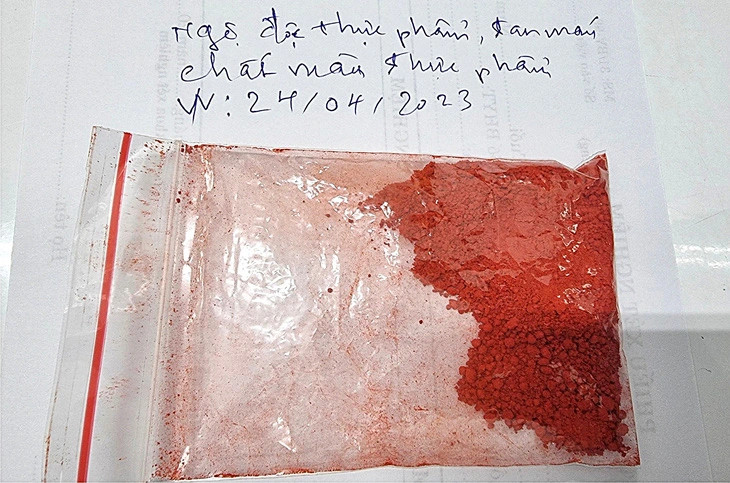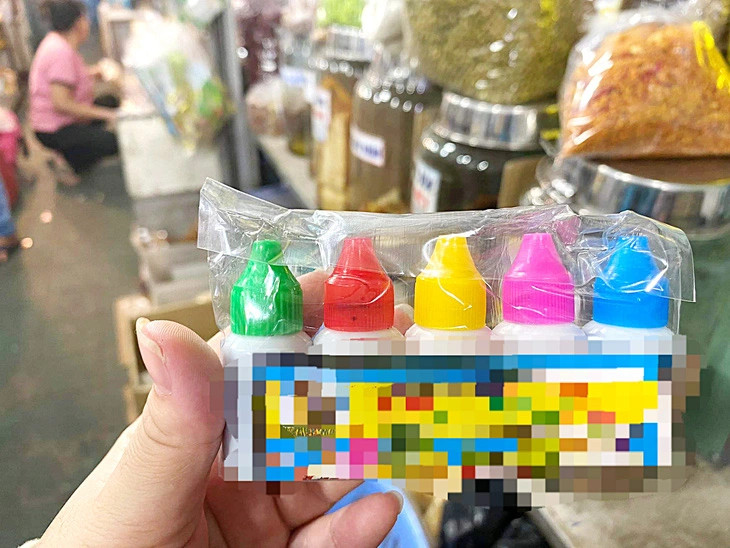Plenty of markets in Ho Chi Minh City sell food dyes and decolorizers of vague origin despite numerous warnings on health risks when using incorrect dosage, raising many concerns about food safety and long-term health effects.
Recently, some local hospitals have seen an upsurge in food poisoning admissions due to an overdose of color additives.
Food colors and bleaches of unspecified sources
The trading of food colorings takes place without fail at many traditional markets in Ho Chi Minh City, such as Thu Duc Market, Ba Chieu Market, Tan Binh Market, Nhat Tao Market, and more.
These substances cost from tens of thousands to a few hundred thousand Vietnamese dong in various colors and forms, with many not clearly stating the chemical ingredients or dosage instructions. (VND10,000= US$0.41)
Many sellers only gave opaque answers when it came to usage and dosage questions, just asking the questioners to dissolve these substances with water and add them to the food until the desired color is achieved.
“The more color is added, the better the color gets,” a merchant said.
Apart from food pigments, food bleach is also offered widely at Kim Bien Market, a place where chemicals are traded at wholesale prices in District 5.
Accordingly, a bag of white powder weighing about one kilogram without labeling is introduced to customers as a food bleach.
It is used for bleaching rice vermicelli or soaking water spinach and grated banana blossom, with a kilogram priced at VND40,000 ($1.63).
Boom in hospital admissions for food poisoning
The Poison Control Center under Hanoi-based Bach Mai Hospital recently treated a 44-year-old woman with severe anemia, or blood and iron deficiency, owing to hemolysis, or destruction of red blood cells.
The patient said she bought 100 grams of bright red food coloring powder, also known as apricot cinnamon powder, at a market.
She mixed 50 grams of this substance with ground pork to make fried spring rolls.
The woman and her two children then had this dish for three consecutive meals.
Two days after the last meal, the mother was hospitalized with several symptoms like dizziness, light-headedness, and shivering.
Her second son who is 12 years old was in the same state.
|
|
| Food color additives without instructions or dosage are potentially fatal. Photo: Ngoc Nhi / Tuoi Tre |
The mentioned food pigment powder samples were found to contain acid Orange 7, normally used as an industrial colorant or food additive, which can trouble the normal function of red blood cells in animals with high doses.
This medical problem is known as methemoglobinemia, said medical staff.
The Poison Control Center of Bach Mai Hospital also received a patient who suffered from acute hemolysis and methemoglobinemia after having beef with red wine powder bought from a traditional market.
The collected food dye sample also contained Orange 7 with a content of 20 percent.
In some other cases, patients who are susceptible to color additives can be racked with allergic reactions or anaphylactic shock, said Dr. Nguyen Nguyen Hien, head of the Department of Medical Examination at the National Hospital for Tropical Diseases in Hanoi.
Warnings about food bleaches or color additives without labeling or correct dose
Most current food bleaches are made from sodium sulfite and other substances but they are mainly cheap, said Assoc. Prof. Nguyen Duy Thinh, a former lecturer at the School of Biotechnology and Food Technology under the Hanoi University of Science and Technology.
These chemicals can be used to wash food but in the correct dosage following the regulations of the Ministry of Health.
If the product is rinsed thoroughly after bleaching, it will not be detrimental to health, Thinh said.
In contrast, consumers can suffer from food poisoning as a result of chemical residues.
Detergents and food dyes without labels and packaging are mainly manufactured on a small scale or of unclear foreign origin.
In addition, these products do not clearly state the expiry date or dosage, which is alarming and potentially fatal.
Assoc. Prof. Thinh also insisted on localities strengthening inspection, guidance, and handling small businesses to ensure they comply with the law.
The authorities should impose heavy penalties on manufacturers and distributors who intentionally violate the rules, Thinh recommended.
Furthermore, it is suggested that customers check labels carefully when shopping for food colorings.
Apart from the substances prohibited by the Vietnam Food Safety Authority under the Ministry of Health, an overdose of food dyes or bleaches can cause food-borne illness or damage to internal organs, such as the liver and kidneys, said Dr. Hien.
According to the Vietnam Food Safety Authority, squids and octopuses that have been treated chemically will have a pure white color compared to the chemical-free ivory-white color.
As for the flesh, it will be abnormally soft and mushy when cut. The meat also produces lots of foam and a foul smell when boiled.
Meanwhile, it is best to eat vegetables and fruits after soaking them in light salt water or potassium permanganate to diffuse the toxins.
Like us on Facebook or follow us on Twitter to get the latest news about Vietnam!
























































